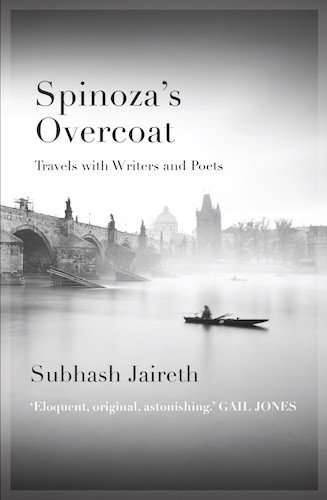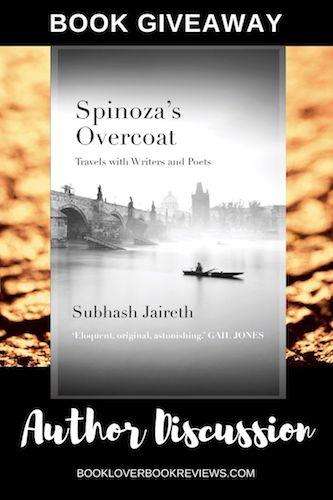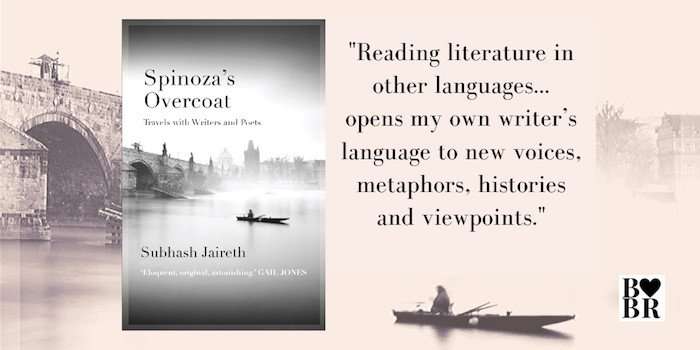Subhash Jaireth on Spinoza’s Overcoat: Travels with Writers & Poets
Today we welcome Subhash Jaireth, to discuss his new book Spinoza’s Overcoat: Travels with Writers and Poets, a collection of essays on the writers, and their writing, that have enriched his own life.
Plus, thanks to Transit Lounge Publishing we have 2 paperback copies for giveaway (entries open to AUS/NZ mailing addresses).
If language is the house of being, the metaphoric house in which I live has three rooms: Hindi, Russian and English. The three languages which define the rooms also include their siblings: history, literature and culture. The doors between the rooms are always open and the walls are permeable and osmotic. I either walk from room to room or let words and voices from each of the rooms waft and float in and around me. At night when I dream, the dreams are often polyglot and multicultural.
The bookshelves in my small working study are occupied by books in multiple languages. Almost daily I get a chance to read something in Hindi, Russian or English. There are maps and atlases of places I have either travelled to or would like to go. I can’t imagine writing without maps: physical as well as imagined; the type which Italo Calvino describes in his unforgettable book, Invisible Cities. I don’t remember how many times I have read this book but each time I open it, I utter words of gratitude to William Weaver, the translator.
I consider translation as an important part of my life and writing. Reading literature in other languages, either in the original or in English translation, opens my own writer’s language to new voices, metaphors, histories and viewpoints.
The essays in Spinoza’s Overcoat wouldn’t have been written if I had lived in a home different from the metaphoric house I have described above. I am blessed that writers and poets such as Behbahani, Bulgakov, Celan, Carson, Ito, Kafka, Lorca, Mandelshtam, Mayakovsky, Pasternak, and Tsvetaeva accepted my invitation to visit my home and share moments of their lives with me, whispering to me words of joy and despair. Their presence in the house enables me to write stories and poems I feel morally and ethically compelled to. Without such an imperative, writing is purposeless. Without it, my stories wouldn’t find the empathetic readers they need. If stories have to live and endure, they need the attention and engagement of such readers; without them they are easily forgotten and mislaid in the cacophony that surrounds us.
I hope reading this book will turn its readers into inquisitive explorers ready to open doors and windows to the world of writing other than their own beloved English.
The world of global literature has incredible authors writing in languages other than English. I’ll be happy if my essays inspire English readers to shake hands with at least a couple of books written in the language other than their primary language.
This book is made of twelve story-like essays. Each essay is focused on a book or a poem I like, and one that had stayed with me for decades. The essays are conceived as biographies of these works. I tell these life-stories by imaginatively combining fictional but believable elements with well-known historical facts about the work and its creator.
Most essays are written in the first-person voice of the narrator who is me and yet is different from me. My presence is similar to that of a reflection in a mirror; a reader will find me in the stories but only as an image.
There are two essays in which I have used fictionalized first-person voices. The essay, My Name is ‘Hamlet’, is written in the voice of Boris Pasternak’s poem Hamlet. It is written like an autobiography. The essay Spinoza’s Overcoat also represents an autobiography. In it, I use fictionalized voice of Paul Celan to tell the story of his two poems.
Disclosure: If you click a link in this post we may earn a small commission to help offset our running costs.
 Spinoza’s Overcoat: Travels with Writers and Poets Synopsis
Spinoza’s Overcoat: Travels with Writers and Poets Synopsis
‘It starts to rain as I step out of my hotel ….’
So begins Subhash Jaireth’s striking collection of essays on the writers, and their writing, that have enriched his own life. The works of Franz Kafka, Marina Tsvetaeva, Mikhail Bulgakov, Paul Celan, Hiromi Ito, Dutch philosopher Baruch Spinoza and others ignite in him the urge to travel (both physically and in spirit), almost like a pilgrim, to the places where such writers were born or died or wrote.
In each essay, a new emotional plane is reached revealing enticing connections. As a novelist, poet, essayist and translator born into a multilingual environment, Jaireth truly understands the power of words across languages and their integral connections to the life of the body and the spirit. Drawing on years of research, translation and travel Spinoza’s Overcoat – and its illuminations of loss, mortality and the reverie of writing – will linger with readers.
‘Eloquent and original, Jaireth’s meditations on the lives-of-poets are full of astonishing details, tender connections and the magnificent melancholy of devotion to words. Encompassing matters of translation, love, mortality and homage, this is a rare model of what might be called “literary philosophy” and an utter joy and surprise for anyone interested in the reading and writing life…’ — GAIL JONES, author of The Death of Noah Glass and Sixty Lights
(February 2020, Transit Lounge Publishing)
Get your copy of Spinoza’s Overcoat from:
Amazon | Booktopia | Transit Lounge
More fascinating essays and memoir:
The Durrells of Corfu by Michael Haag / The Watermill by Arnold Zable / Belinda Murrel on Searching for Charlotte with Kate Forsyth / The Professor & The Madman by Simon Winchester
About the Author, Subhash Jaireth
 Subhash Jaireth was born in Punjab, India. Between 1969 and 1978 he spent nine years in Russia studying geology and Russian literature. In 1986 he migrated to Australia. He has published poetry in Hindi, English and Russian. His published works include Yashodhara: Six Seasons Without You (Wild Peony, 2003), Unfinished Poems for Your Violin (Penguin Australia, 1996), Golee Lagne Se Pahle (Before the Bullet Hit Me) (Vani Prakashan, 1994), To Silence: Three Autobiographies (Puncher & Wattmann, 2011), After Love (Transit Lounge, 2012), Moments (Puncher & Wattmann, 2014) and Incantations (Recent Work Press, 2016). A Catalan translation of the novel After Love was published in October 2018 in Valencia. He has also published English translations of Russian, Japanese and Persian poetry, and has translated poems of Indigenous Australian poets into Hindi.
Subhash Jaireth was born in Punjab, India. Between 1969 and 1978 he spent nine years in Russia studying geology and Russian literature. In 1986 he migrated to Australia. He has published poetry in Hindi, English and Russian. His published works include Yashodhara: Six Seasons Without You (Wild Peony, 2003), Unfinished Poems for Your Violin (Penguin Australia, 1996), Golee Lagne Se Pahle (Before the Bullet Hit Me) (Vani Prakashan, 1994), To Silence: Three Autobiographies (Puncher & Wattmann, 2011), After Love (Transit Lounge, 2012), Moments (Puncher & Wattmann, 2014) and Incantations (Recent Work Press, 2016). A Catalan translation of the novel After Love was published in October 2018 in Valencia. He has also published English translations of Russian, Japanese and Persian poetry, and has translated poems of Indigenous Australian poets into Hindi.
Book Giveaway
Thanks to Transit Lounge Publishing we have 2 paperback copies to giveaway. Open only to those with Australian or New Zealand mailing addresses. Entries close midnight 20 February 2020. See entry form below.
You can improve your chance of winning by:
- retweeting this Tweet
- sharing this Pin with your followers on Pinterest ; and
- sharing this Facebook post (incl. entry link) with your Facebook followers
The lucky winner will be randomly selected and announced on our Facebook Page.
SORRY, ENTRIES CLOSED — See winners announcement.

